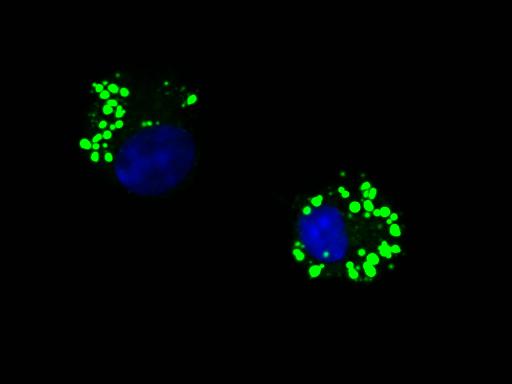Study by the University of Bonn proves success of a so-called ketogenic diet

Credit: © Dr. Fotios Karagiannis/Uni Bonn
Can a special diet help in certain cases of asthma? A new study at the University of Bonn at least points to this conclusion. According to the study, mice that were switched to a so-called ketogenic diet showed significantly reduced inflammation of the respiratory tract. The results are now published in the renowned journal Immunity.
Asthma patients react even to low concentrations of some allergens with severe inflammation of the bronchi. This is also accompanied by increased mucus production, which makes breathing even more difficult. A central role here is played by cells of the innate immune system, which were only discovered a few years ago and are called Innate Lymphoid Cells (ILC). They perform an important protective function in the lungs by regenerating damaged mucous membranes. For this purpose they produce inflammatory messengers from the group of cytokines, which stimulate division of the mucosal cells and promote mucus production.
This mechanism is normally very useful: It allows the body to quickly repair damage caused by pathogens or harmful substances. The mucus then transports the pathogens out of the bronchial tubes and protects the respiratory tract against re-infection. “With asthma, however, the inflammatory reaction is much stronger and longer than normal”, emphasizes Prof. Dr. Christoph Wilhelm from the Institute for Clinical Chemistry and Clinical Pharmacology, who is a member of the Cluster of Excellence ImmunoSensation at the University of Bonn. The consequences are extreme breathing difficulties, which can even be life-threatening.
Rapid reproduction
The ILCs multiply rapidly during this process and produce large amounts of proinflammatory cytokines. Scientists hope that if their division could be slowed down, it may be possible to bring the excessive reaction under control. In fact, the results now published point in exactly this direction. “We have investigated which metabolic processes are active in the ILCs when they switch to reproduction mode,” explains Wilhelm’s colleague Dr. Fotios Karagiannis. “Then we tried to block these metabolic pathways and thereby reduce the speed at which the cells divide.”
Some metabolic pathways were in fact significantly more active in dividing ILCs. They primarily ensure that the cells are supplied with energy and with the building blocks they require for reproduction. The latter include, for example, fatty acids that are needed to make the cell membrane. This forms a thin skin with which cells separate themselves from their surroundings. “Activated ILCs therefore absorb fatty acids from their environment and store them in their interior in small droplets for a short time, before they utilise them for energy or building membranes,” explains Karagiannis.
But what happens if cells are forced to use these fatty acids elsewhere? To answer this question, the researchers put asthmatic mice on a diet that contained mainly fats, but hardly any carbohydrates or proteins. With this diet, also known as a ketogenic diet, the cell metabolism changes: The cells now get the energy they need from burning fat. However, this means that they lack fatty acids, which they need for the formation of new membranes during cell division.
As a consequence, the division activity of the ILCs in the rodents fed a special diet decreased – dramatically: “Normally, contact with allergens increases the number of ILCs in the bronchi fourfold,” says Prof. Wilhelm. “In our experimental animals, however, it remained almost unchanged. Both mucus production and other asthma symptoms decreased accordingly.”
This is not only due to the switch to fats as an alternative energy source and the resulting shortage of fatty acids. The glucose deficiency presumably also directly contributes to the reduced activity of the ILCs. “The prevalence of asthma has increased dramatically over the last few decades. Perhaps this is also related to an increasingly common high-sugar and high-fat diet,” speculates Wilhelm.
The scientists now want to investigate on patients whether a ketogenic diet can prevent asthma attacks. However, this is not completely without long-term risks and should only be carried out in consultation with a doctor. “We are therefore trying to determine which components of the dietary change are responsible for the effect,” explains Wilhelm. “Maybe this will open the door to the development of new drugs.”
It is known that a ketogenic diet can be an effective therapy for some diseases. For instance, patients with certain forms of epilepsy are treated with this method. And the change in diet is also said to help with some tumors – after all, the cells in them also multiply unusually strongly.
###
Publication: Fotios Karagiannis, Schekufe Kharabi Masouleh, Klaus Wunderling, Jayagopi Surendar, Vanessa Schmitt, Alexander Kazakov, Marcel Michla, Michael Hölzel, Christoph Thiele & Christoph Wilhelm: Lipid-droplet formation drives pathogenic group 2 innate lymphoid cells in airway inflammation; Immunity; DOI: 10.1016/j.immuni.2020.03.003
Contact:
Prof. Dr. Christoph Wilhelm
Institute for Clinical Chemistry and Clinical Pharmacology
University of Bonn
Tel. +49-(0)228-28751721
E-mail: [email protected]
Media Contact
Christoph Wilhelm
[email protected]
Related Journal Article
http://dx.




